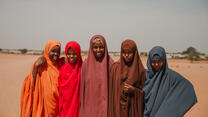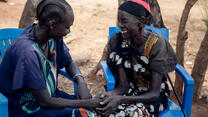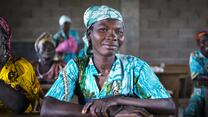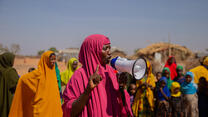WHO WE ARE
The mission of the International Rescue Committee (IRC) is to help people whose lives and livelihoods are shattered by conflict and disaster to survive, recover and gain control of their future. Our vision is that the IRC will lead the humanitarian field by implementing high-impact, cost-effective programs for people affected by crisis, and shape global policy and practice by sharing our learning and experience with others. All IRC programs are designed to achieve meaningful change in people’s health, safety, education, economic wellbeing and ability to influence the decisions that affect their lives.
The Economic Recovery and Development (ERD) unit at the IRC works to ensure that those we serve have their most basic survival needs met and have the combination of assets and income to prosper. Our women economic empowerment programs improve women’s financial wellbeing, so they can support themselves and their families.
WHY OUR WORK MATTERS
Women and children make up the vast majority of those fleeing conflict and disaster around the world. In the Syria crisis, more than 75% of the displaced are women and children.
Due to pre-existing gender inequalities and discrimination, women and girls bear the brunt of the impact of conflict and disaster. Women and girls face a myriad of gender-specific challenges, including lesser decision-making power over resources, fewer opportunities to participate in the work force, unequal educational opportunities, and a lack of reproductive and sexual health services. Women are given less or no power over financial and business decisions, inhibiting their participation in community, political or economic forums.
In the contexts in which we work, women are often undertaking the most time consuming work in agricultural and yet do not get paid nor receive profits. The care giving work they provide for their family members to pursue economic opportunities is not valued nor considered an extra time burden. Girls are usually the first to be asked to leave school when money is tight or household chores or free family labor is needed. Girls’ education is not considered a valuable investment. Additionally, professional development pathways are rarely designed to accommodate women and girls.
Limited or no access to sexual and reproductive health services means that women and girls are stuck in a cycle of early marriage, early and unplanned pregnancies resulting in health and economic implications that prevent them from finishing education, pursuing economic opportunities and breaking out of poverty. As a result, women are forced to depend on other, often male, family members.
When women have control over resources, their status in the household and community increases, providing them with more chances to participate in decisions that affect their lives.
WHAT WE DO
IRC practitioners provide technical assistance to more than 30 country programs. Technical advisors are charged with staying abreast of the best available research and practices in their respective fields and sharing these with the IRC’s frontline teams. They also lead advocacy strategies to encourage partners and policy makers to adopt the interventions proven to be effective based on our research and experience.
Through the IRC’s women economic empowerment programs, we not only increase women’s and girls’ access to and control over economic resources, we also offer safe spaces for women and girls to develop critical support networks and life skills to foster resiliency, economic opportunities and reduce violence against women and girls.
Economic and Social Empowerment (EA$E)
The IRC’s innovative EA$E model combines tested economic interventions, namely Village Savings and Loans Associations (VSLAs) and business skills training with targeted gender discussion groups facilitated for female VSLA members and their spouses or key male gatekeepers in the home.
Through VSLAs, women can access financial savings and loan services, and our economic empowerment interventions help women develop income generating activities and small businesses while mitigating potential violent repercussions for women who are economically empowered. Facilitators guide participants to create more equitable and safe gender dynamics in the household. This model was evaluated in Burundi and Cote d’Ivoire and showed a reduction in intimate partner violence, an increase in decision- making authority for women and reduced tolerance of violence.
Cash Relief
The IRC is responding to the Syria crisis by delivering pre-loaded ATM cards to vulnerable women and female-headed households, allowing them to take control over their lives and decide how best to spend their money. Recipients of cash relief participated in activities aimed at raising awareness of violence against women and girls. Women reported feeling stronger, confident and respected. Women and men reported fewer arguments and conflicts over money, leading to a reduction of violence in the home.
Cash relief mitigated risks of violence against women as a result of economic pressures and enabled women to avoid negative coping mechanisms such as exploitative work, survival sex, or child labor.
Gender sensitive value chain development work
To achieve gender equality in agricultural work, women require equitable access to inputs and resources, caregiver services and access to customized information.
Gender norms that curtail women’s potential in farming include limitations to women’s control and ownership of resources and their own mobility, unequal workloads, lower education levels and traditional limitations to specific value chains.
To address these inequalities, the IRC integrates behavioral change interventions across its spectrum of agricultural programming. These interventions surface harmful traditional social norms enforcing gender and age inequalities and their crippling impact
on economic wellbeing. Continuous engagement with communities and individuals through discussion groups and trainings raises awareness of these issues and provides opportunities to develop appropriate solutions.
The IRC integrates a gender-sensitive lens to agriculture value chain development. This includes targeting female value chains, safely integrating women into traditionally non-female value chains, and working with financial institutions to enhance women’s access to formal and informal financial services.
In Uganda and Zimbabwe, the IRC worked with female farmers to safely enhance their agency and their income. In Uganda, women’s participation in leadership roles increased from 30 to 72 percent, and more women-owned agri-businesses were established.



